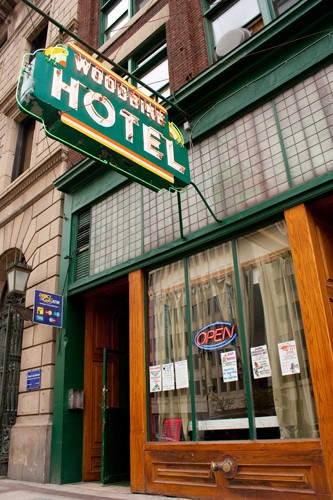Possible hotel buyouts to target drunken behaviour downtown
Residents concerned they may be turfed
A recent city strategy to crack down on public intoxication in and around downtown hotels just may close the door on downtown hotel residents.
The Portage Avenue Action Strategy, drafted by the development agency CentreVenture and adopted by Winnipeg’s city council in July, states that the city will work with hotels, vendors and the Manitoba Liquor Control Commission (MLCC) to limit drunken behaviour downtown.
Diana Soroka, spokeswoman for the MLCC, says that they are already working closely with the Downtown BIZ by providing funding and training for the Downtown Watch program with regards to working with intoxicated members of the public.
Reportedly, Mayor Sam Katz is supportive of considering buying out the liquor licences at historic downtown hotels like The Maclaren and The Woodbine in order to shut them down or convert them. The goals of these actions, according to the strategy, are to make the downtown more comfortable for the public and to attract and keep investment.
Local social service agencies, hotel residents and academics wonder what impact this will have on the people who depend on these hotels as a long-term housing option.
“We need to recognize that the people living in these hotels are people and citizens first,” said Karen Hoeft, assistant executive director in community relations for the Salvation Army. The Salvation Army, a Christian social service agency, provides 500 beds across three shelters in Winnipeg, 70 of which are for intoxicated people.
“It is intolerable when we stereotype hotel residents by calling for fewer drunks,” Hoeft said. “We tend to put a more stringent ideology on this population, who just happens to not have a voice.”
Downtown hotels may be the only option for some, Hoeft notes, not because they’re drunks but because they can’t afford to live anywhere else due to low vacancy rates or because they cannot meet the tenancy requirements of holding a lease.
Marlborough Hotel resident Maria Twersky agrees.
“People are trying to help themselves when they live in hotels like this,” Twersky said.
“ People are trying to help themselves when they live in hotels like this.
Maria Twersky, resident of The Marlborough Hotel
Even if the Portage Avenue Action Strategy includes some low-income and student housing, Twersky is concerned that there would be a lot of people left homeless.
“They don’t really care if you’re here or not,” said Twersky. “We have humane societies for animals, but what about human beings as well?”
Jim Silver, co-director of the University of Winnipeg’s Urban and Inner-City Studies program, cautions that the Portage Avenue Action Strategy needs to go beyond cleaning up a part of the city by relocating what seems to be the problem. Instead, it should try to address the problem of access to housing for low-income people.
“There is a shortage of affordable housing in Winnipeg,” said Silver. “Further, these hotels are part of Winnipeg’s history, and businesses as well. We can’t just shut down a legally operating business.”
While the MLCC is not directly involved in decisions on hotel buyouts, Soroka notes that the bars in these hotels are operating as a business and they have every right to be profitable.
Deputy Mayor Justin Swandel notes that the hotel buyout option is still at the concept stage and will be reviewed in some detail before council moves forward on it.
Published in Volume 65, Number 3 of The Uniter (September 16, 2010)







